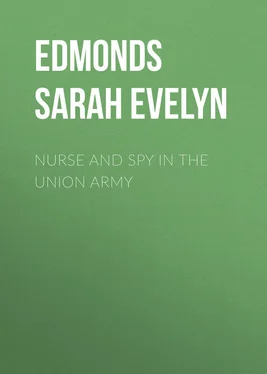Sarah Edmonds - Nurse and Spy in the Union Army
Здесь есть возможность читать онлайн «Sarah Edmonds - Nurse and Spy in the Union Army» — ознакомительный отрывок электронной книги совершенно бесплатно, а после прочтения отрывка купить полную версию. В некоторых случаях можно слушать аудио, скачать через торрент в формате fb2 и присутствует краткое содержание. Жанр: История, История, foreign_antique, foreign_prose, на английском языке. Описание произведения, (предисловие) а так же отзывы посетителей доступны на портале библиотеки ЛибКат.
- Название:Nurse and Spy in the Union Army
- Автор:
- Жанр:
- Год:неизвестен
- ISBN:нет данных
- Рейтинг книги:4 / 5. Голосов: 1
-
Избранное:Добавить в избранное
- Отзывы:
-
Ваша оценка:
- 80
- 1
- 2
- 3
- 4
- 5
Nurse and Spy in the Union Army: краткое содержание, описание и аннотация
Предлагаем к чтению аннотацию, описание, краткое содержание или предисловие (зависит от того, что написал сам автор книги «Nurse and Spy in the Union Army»). Если вы не нашли необходимую информацию о книге — напишите в комментариях, мы постараемся отыскать её.
Nurse and Spy in the Union Army — читать онлайн ознакомительный отрывок
Ниже представлен текст книги, разбитый по страницам. Система сохранения места последней прочитанной страницы, позволяет с удобством читать онлайн бесплатно книгу «Nurse and Spy in the Union Army», без необходимости каждый раз заново искать на чём Вы остановились. Поставьте закладку, и сможете в любой момент перейти на страницу, на которой закончили чтение.
Интервал:
Закладка:
“The engine is not of great power, as the vessel was designed as a battery, and not for swift sailing. It being almost entirely under water, the ventilation is secured by blowers, drawing the air in forward, and discharging it aft. A separate engine moves the blowers and fans the fires. There is no chimney, so the draft must be entirely artificial. The smoke passes out of gratings in the deck. Many suppose the Monitor to be merely an iron-clad vessel, with a turret; but there are, in fact, between thirty and forty patentable inventions upon her, and the turret is by no means the most important one. Very properly, what these inventions are is not proclaimed to the public.”
CHAPTER V
ARRIVAL AT FORTRESS MONROE – THE VILLAGE OF HAMPTON – VISITING THE CONTRABANDS – ARRIVAL OF FUGITIVES – A REAL “CAMP MEETING” – FEEDING THE NEGROES – CAMP MISERIES – MULES – MISS PERIWINKLE’S MULES – THE COQUETTISH, THE MORAL, THE HISTRIONIC, AND THE PATHETIC MULE – OUR JACK – LINES OF LOVE – MY BOX AND PRESENTS – A THREE-STORY CAKE – A SERENADE AND SURPRISE PARTY – GOOD AND BAD CHAPLAINS – THE MORALS OF THE ARMY – SLANDERS ABOUT SOLDIERS.
We arrived at Fortress Monroe in a drenching rain, immediately disembarked, and proceeded at once to Hampton – formerly a beautiful little village containing about five hundred houses, many of them elegant brick buildings, but which now lay a blackened mass of ruins, having been burned a few months previous by order of rebel General Magruder. The village was about three miles from Fortress Monroe, and situated on the west side of a creek, or arm of the sea, called Hampton river, the Yorktown road passing directly through its center. It was a great relief to the troops to disembark from the filthy, crowded transports, notwithstanding they had to march through the mud and rain, and then pitch their tents on the wet ground. Fires were soon built, coffee made, and nice fresh bread served out, which was brought to us by the commissary department at the fort.
As Mrs. B. and I had a little respite at this particular juncture, we set about visiting the contrabands. They occupied a long row of board buildings near the fort. The men were employed in loading and unloading Government vessels, and the women were busily engaged in cooking and washing. No language can describe the joy of these men and women at being liberated from bondage. As the Jews of old were looking for the promised Messiah, so the slaves universally regarded the advent of the northern army as the harbinger of their deliverance.
Mr. A. relates the following anecdote, illustrative of this fact, which took place at the battle of Newbern: “A slaveholder, breathless with terror, spurred his horse to his utmost speed past his own house, not venturing to stop. Just then a shell, with its terrific, unearthly shriek, rushed through the air over his head. A poor slave, a man of unfeigned piety and fervent prayer, in uncontrollable emotions of joy, ran into his humble cabin, shouting: ‘Wife, he is running, he is running, and the wrath of God is after him. Glory hallelujah! the appointed time has come; we are free, we are free!’”
With regard to my own visit to the contraband quarters, I give the following extract from my journal: “Visited the contrabands to-day, and was much pleased with their cheerful, happy appearance. They are exceedingly ignorant, yet there is one subject upon which they can converse freely and intelligibly, and that is – Christ – the way of salvation. Almost all with whom I conversed to-day were praying men and women. Oh, how I should like to teach these people! They seem so anxious for instruction, I know they would learn quickly. Some of them are whiter and prettier than most of our northern ladies. There is a family here, all of whom have blue eyes, light hair, fair skin and rosy cheeks; yet they are contrabands, and have been slaves. But why should blue eyes and golden hair be the distinction between bond and free?”
One bitter, stormy night, about eleven o’clock, a band of these poor fugitives, numbering over forty, presented themselves at the picket line, for admittance to the federal camp, imploring protection. The officer of the picket guard being called, and the case presented, the contrabands were permitted to pass through. But no sooner had their poor torn and bleeding feet touched the federal soil, than they fell upon their knees, and returned thanks to God and to the soldiers for their deliverance. They came into camp about one o’clock in the morning, shouting “Glory! Glory to God!” Notwithstanding the early hour, and the stormy night, the whole camp was aroused; every one rushed out to find out the cause of the excitement. There they were, black as midnight, all huddled together in a little group – some praying, some singing, and others shouting. We had a real “camp meeting” time for a while. Soon the exercises changed, and they began to relate their experiences, not only religious experiences, but a brief history of their lives. Some were husbands and fathers. Their masters had sold them down south, lest they should escape. In their terror they had escaped by night, and fled to the National banner for refuge, leaving all behind that was dear to them.
In conclusion, one old man, evidently their leader, stood up and said: “I tell you, my breddern, dat de good Lord has borne wid dis yere slav’ry long time wid great patience. But now he can’t bore it no longer, no how; and he has said to de people ob de North – go and tell de slaveholders to let de people go, dat dey may sarve me.” There were many there who had listened to the old colored man’s speech and believed, as I did, that there was more truth than poetry in it. Many hearts were moved with sympathy towards them, as was soon proved by the actions of the soldiers.
An immense fire was built, around which these poor darkies eagerly gathered, as they were both wet, cold and hungry; then a large camp kettle of coffee was made and set before them, with plenty of bread and meat to satisfy their ravenous appetites – for ravenous they were, not having tasted food for more than two days. Then blankets were provided, and they soon became comfortable, and as happy as human beings could be under such circumstances. Mrs. B. and I returned to our tents feeling very much like indorsing the sentiment of “Will Jones’ resolve:”
Resolved, although my brother be a slave,
And poor and black, he is my brother still;
Can I, o’er trampled “institutions,” save
That brother from the chain and lash, I will.
A cold, drizzling rain continued to descend for several days, and our camp became a fair specimen of “Virginia mud.” I began to feel the effects of the miasma which came floating on every breeze from the adjacent swamps and marshes, and fever and ague became my daily companions for a time. As I sat in my tent, roasting or shivering as the case might be, I took a strange pleasure in watching the long trains of six mule teams which were constantly passing and repassing within a few rods of my tent. As “Miss Periwinkle” remarks, there are several classes of mules. “The coquettish mule has small feet, a nicely trimmed tail, perked up ears, and seems much given to little tosses of the head, affected skips and prances, and, if he wears bells or streamers, puts on as many airs as any belle. The moral mule is a stout, hardworking creature, always tugging with all his might, often pulling away after the rest have stopped, laboring under the conscientious delusion that food for the entire army depends upon his individual exertions. The histrionic mule is a melo-dramatic sort of quadruped, prone to startle humanity by erratic leaps and wild plunges, much shaking of the stubborn head and lashing of his vicious heels; now and then falling flat, and apparently dying a la Forrest, a gasp, a groan, a shudder, etc., till the street is blocked up, the drivers all swearing like so many demons, and the chief actor’s circulation becomes decidedly quickened by every variety of kick, cuff and jerk imaginable. When the last breath seems to have gone with the last kick, and the harness has been taken off, then a sudden resurrection takes place. He springs to his feet, and proceeds to give himself two or three comfortable shakes, and if ever mule laughed in scornful triumph it is he, and as he calmly surveys the excited crowd, seems to say: ‘A hit! a decided hit!’ For once the most stupid of all animals has outwitted more than a dozen of the lords of creation. The pathetic mule is, perhaps, the most interesting of all; for although he always seems to be the smallest, thinnest, and weakest of the six, yet, in addition to his equal portion of the heavy load, he carries on his back a great postillion, with tremendous boots, long tailed coat, and heavy whip. This poor creature struggles feebly along, head down, coat muddy and rough, eye spiritless and sad, and his whole appearance a perfect picture of meek misery, fit to touch a heart of stone. Then there is another class of mules which always have a jolly, cheer-up sort of look about them – they take everything good naturedly, from cudgeling to carressing, and march along with a roguish twinkle in their eye which is very interesting.”
Читать дальшеИнтервал:
Закладка:
Похожие книги на «Nurse and Spy in the Union Army»
Представляем Вашему вниманию похожие книги на «Nurse and Spy in the Union Army» списком для выбора. Мы отобрали схожую по названию и смыслу литературу в надежде предоставить читателям больше вариантов отыскать новые, интересные, ещё непрочитанные произведения.
Обсуждение, отзывы о книге «Nurse and Spy in the Union Army» и просто собственные мнения читателей. Оставьте ваши комментарии, напишите, что Вы думаете о произведении, его смысле или главных героях. Укажите что конкретно понравилось, а что нет, и почему Вы так считаете.












